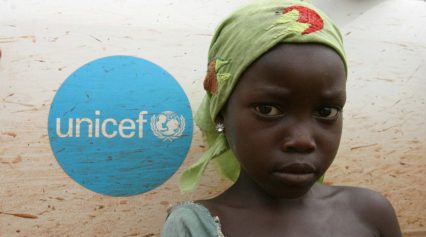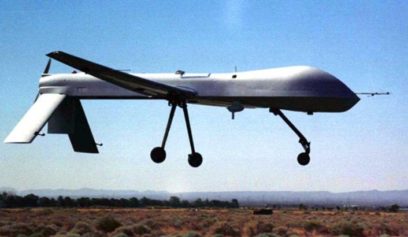With the recent United Nations Security Council’s adoption of resolution 2349 condemning terrorism and encouraging military cooperation in Africa’s Lake Chad Basin, an international spotlight will once again be cast upon the contested region near Nigeria’s northeast border. While much attention was justifiably given to the kidnapping of 276 school girls by the militant group Boko Haram in 2014, little attention has been paid to the increasing role of AFRICOM— a U.S.-led military entity officially labeled the United States Africa Command— and its claims in its professed mission to protect and stabilize the region.
Even less attention has been given to why AFRICOM was created in the first place. The organization touts its “core mission of assisting African states and regional organizations to strengthen their defense capabilities better enables Africans to address their security threats and reduces threats to U.S. interests.” However, given Africans did not ask for their assistance — AFRICOM was forced to set up headquarters in Germany in 2008 because they were not welcome on the continent — some question both its presence and its very existence as an organization.
“There are those of us who believe there are ulterior motives and other agendas in play,” says Mark P. Fancher, an attorney and blogger who has followed AFRICOM since its inception.
Fancher acknowledges the eight-year Boko Haram insurgency against the Nigerian government and how most of the news coming out of the region is concentrated on acts of terrorism and human rights atrocities. But, he clarifies the incomplete nature of such accounts.
“The other thing that has been going on there for about 30 years is exploration for oil,” says Fancher, explaining “they believe they’re getting closer to being able to actually extract deposits and make it a new source of oil.”
As far back as 2008, years before the international community had even heard of the imposed moniker Boko Haram, the militant group had successfully run Chinese oil interests out of the potentially lucrative region. Recent estimates from the Nigerian government and related industry experts have hovered around two billion barrels of oil with roughly 14.65 trillion standard cubic feet of natural gas in the Chad Basin.
Within the past few months, Fancher says, AFRICOM “has taken it upon itself to assemble representatives for military forces in the region, along with a few European military forces, to chart out a plan for stabilizing the region specifically with respect to Boko Haram.” Well prior to the recent UN Security Council Resolution, he notes, AFRICOM had targeted April for “plotting out a military offensive against Boko Haram.”
It’s certainly not the first time AFRICOM has plotted such an offensive on African soil. In fact, its rapid expansion on the continent can mostly be credited to the dramatic events of October 2011 as Western air strikes lit up the skies of the Libyan capital, Tripoli. The Obama-backed NATO coalition had targeted longtime leader Muammar Gaddafi — considered for years to be the most powerful man in Africa, given his former chairmanship of the African Union and the stable, oil-rich nation he led for 42 years — for regime change ostensibly to implement United Nations Security Council Resolution 1973 and “an immediate ceasefire” in Libya, including an end to “current attacks against civilians.”
However, ulterior Western motives were apparent from the beginning of the mission. One that moved from protecting “citizens” to facilitating “regime change” to break Gaddafi’s powerful influence on the continent. As founder, primary funder and a former chair of the African Union who’d committed billions to establishing the continent’s independence from foreign manipulation—he worked toward a continental gold standard and the creation of an African Union Development Bank—Gaddafi posed a serious roadblock to foreign business interests in Africa and was a vocal critic at times of western intervention in Africa. Consistently, AFRICOM’s 2008 establishment of its headquarters in Stuttgart, Germany, rather than in Africa itself was largely a result of the Libyan leader’s cash and investment offerings to African nations who rejected U.S. requests for continental military bases. With Gaddafi eliminated, AFRICOM now has a presence by way of projects, operations or engagements in almost every country on the continent.
Such motives are far from unprecedented. The Berlin Conference, initiated in 1884, systematized Europe’s imperial desires and ushered in an era of brutal colonial activity that squashed existing forms of African self-governance for land grabs and the extraction of the continent’s natural resources. Such repression was abetted by numerous Western oil companies in the 20th century which, despite mid-century independence movements, still maintained a considerable influence over Africa’s economic and political activities. Fast forward to 2008 and one could question how much has changed given the creation of AFRICOM amidst a steadily increasing Chinese footprint on the continent and an American desire to reestablish itself through the threat or use of military might. The 2011 NATO coalition that both stoked and capitalized upon Libyan civil unrest represents a 21st-century continuum of the imperial policies established in Berlin long ago.
The emergence of armed insurgents like Boko Haram, in Nigeria has recently over-shadowed its recognition as Africa’s most populous nation, its largest economy and biggest
And once the terror spreads, what better way to capitalize upon such instability then to wage conflicts by proxy where Western business interests can appear as if their hands are clean while extracting oil revenues to the tune of billions? Or, as Dan Glazebrook stated in his May 2012 article for Counterpunch, “The invasions of Iraq and Afghanistan showed the West that wars in which their own citizens get killed are not popular. … AFRICOM is designed to ensure that in the coming colonial wars against Africa, it will be Africans who do the fighting and dying, not Westerners.”
But in person or by proxy, “AFRICOM has no business in Africa in the first place,” Fancher says. “To the extent there are military needs, Africa has its own armies and those are the military forces most appropriate for addressing the security concerns within their own countries.”
What they don’t need, Fancher continues, is “the United States jumping into these situations.”
But, he adds, “the U.S. does it because it has its own agenda.”


